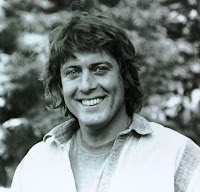Among those that the North Coast and North Coast theatre lost in 2023 were Donald Forrest, Charlie Myers and Bernadette Cheyne.
Donald Forrest was an artistic director of Dell’Arte in the 1970s , together with Michael Fields and Joan Schirle. They were very active as performers, not only on the North Coast but throughout California and elsewhere in the world.Before that he’d been an actor in Manhattan (Broadway to Off-Off) and a member of the San Francisco Mime Troupe. “He brought physical theater to new heights,” said his friend Michael Fields. Fields directed Forrest’s last performance shortly before his death: the title role in an adaptation of Shakespeare’s King Lear called The Logger Lear, performed at the Logger Bar (which Fields now owns) in Blue Lake. Donald Forrest also became known locally for starting a theatre program in Blue Lake schools, and bringing an eighth grade student production to the Carlo Theatre annually.
 |
| Donald Forrest in Logger Lear |
Donald Forrest died in October of complications from Covid-19. He was 73.
Charlie Myers may be remembered more broadly for his love of film. He was the movie reviewer for the North Coast Journal during some of the years I was writing their theatre column, and before that he circulated a weekly roundup via email of movies showing in Arcata. But within the North Coast theatre community he was known as a director and a teacher. He came to Humboldt State College in 1969 and didn’t fully retire until well into the 21st century.Charlie was one of the first people I met when Margaret and I moved to Humboldt in 1996. He was chair of what was then the Theatre Arts department of Humboldt State University, and was instrumental in hiring Margaret to teach dramatic writing. He and his wife Claudia even found us our first dwelling place here. From him especially (but also John Heckel) we heard tales of the theatre department in its heyday, when the faculty was much larger, and there were many more productions with longer runs. It turned out we arrived for the last few years of the department’s glory. For someone with a fairly sardonic view of things, I was impressed by how much he was sincerely concerned for the department’s students.
Charlie was a very sociable guy and had a wide range of interests, including music and books (I envied his extensive climate-controlled library at his rural home—where, during a housesitting gig, I made particular friends with their goat.) Those interests and more on his very full life are reflected in Claudia’s appreciation published in the Lost Coast Outpost. Charlie Myers died in September 2023. Again complications from Covid-19 were involved. He was 85.
Bernadette Cheyne came to the North Coast from Texas by way of Alaska and her family’s farm in Wisconsin. She taught a range of courses for HSU theatre, but was especially known for her acting classes and her work with acting students on vocal production and dialects. From the start she acted with distinction in university and community productions, then added directing, both of which she continued to do into her final year.Bernadette was also adept at university politics, and served on the statewide academic Senate, then becoming the vice-chair of the California State University Board of Trustees. It had been her advocacy and skill as chair of what had become the HSU Department of Theatre, Film and Dance that went a long way in saving the department from extinction during a budget crisis. After her retirement in 2013 she was active for some years in the Humboldt County Grand Jury.
As department chair, Bernadette hired me to do publicity for several HSU productions, which led to a regular gig. She was always encouraging and her support was definitive. We also shared a devotion to Star Trek: The Next Generation, and so I showed up at her retirement party in uniform.
She and Margaret were close. Bernadette was just about the only person we saw in the early Covid years: we visited her at her home surrounded by woods, and she was our guest here.
 |
| Bernadette in "Mother Courage" at HSU |
Vitality—in her work, her conversation and social life, her personal warmth, and the way she dressed and presented herself to the world—characterized Bernadette. I remember seeing her in the spring of a year she was chair, and she was clearly at the edge of exhaustion. But by the fall she had bounced back, ready to embrace the challenges and opportunities of a new school year.
Bernadette’s brain cancer wasn’t apparent until it was advanced. She died in October. She was 74.
May they rest in peace. The legacy of their lives and work lives on in the lives and work of others.




